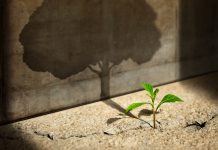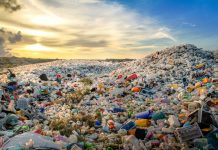Attitudes to material acquisition have varied greatly through the ages, but now, the world is exacerbating the climate crisis with overconsumption. How do we change this?
Have you ever noticed how head-scratchingly normalised our destructive economy is? If fossil fuels suddenly appeared overnight, their catastrophic impact would horrify us. But these substances have so incrementally become part of everyday life nearly everywhere on Earth that their toxic side effects are largely accepted and ignored. And to worsen the blow, overconsumption of resources is only getting bigger – as is our waste.
This curtails any actions we can take against the climate crisis – because it doesn’t feel like a crisis.
Are we inevitably – and inescapably – short-term thinkers? Probably not. But we must be smart about communicating about packaging waste to make long-term thinking and action compatible with our irrational human tendencies.
It’s time we talked about the elephant crashing around the room: overconsumption
Amiable consumers, who have good intentions and aspire to better lives? Or an unhappy place fuelled by excess? Either way, we’re dealing with a seemingly unfathomable dilemma: securing jobs in supply chains premised on depleting the planet’s resources or robbing millions of people of their livelihoods to achieve global environmental goals.
We need to rethink how everyday conveniences erode our understanding of what it means to be human. Without a cultural revolution that frees us from our addiction to buying and overconsumption, consuming and then throwing things away, we risk submerging the entire planet in waste.
Based on our record so far, bookmakers would offer long odds.
The real struggle with overconsumption waste occurs around behavioural economics and our ability to coerce the wider public to embrace a smart, context-sensitive, generational approach to a heavily nuanced agenda.
Attitudes to material acquisition have varied greatly through the ages. And in many ways, we’re more comfortable than ever before. But consider for a moment how our sheltered, temperature-controlled, overfed, under-challenged lives could be the leading cause of many of our most urgent physical and mental health issues.
For many of us, modern memory is shaped less by a longing for the social customs and practices of the past or family heirlooms handed down over generations and more by childhood encounters with transient commercial goods and fleeting media moments in our age of fast capitalism.
We are devouring the planet’s resources at a rate 1.7 times faster than it can regenerate
Now more than ever, we should be swimming upstream against the undercurrents of comfort and ease that we seek and have grown unquestioningly used to.
As an alternative approach to a linear economy, circular systems focus on closing resource flows, extending product life cycles, creating new by-products through reuse, recycling and regenerative techniques, or building innovative community-sharing models of production and consumption.
Circular systems focus on closing resource flows and extending product life cycles
Large and transnational businesses must properly account for their impacts on biodiversity and their dependency on it. Having to disclose those impacts puts healthy pressure on them both internally and externally.
If people buy less stuff, we will see immediate drops in emissions, resource consumption and pollution, unlike anything we’ve achieved with green technology.
Our behaviour and our influence in waste responsibility
Every act of human behaviour has multiple layers of causation, spiralling back seconds, minutes, hours, days, months, years, and even centuries.
So, like it or not, the packaging sector is, by proxy, in the business of influencing decisions, and we need to understand what drives them. Motivation, ability to participate and perceived benefits are the crucial factors that significantly influence households’ attitudes towards end-of-life treatment methods for packaging waste.
We often unwittingly build barriers to seeing what is in front of us. Both as individuals and organisations, we can hold on to flawed beliefs and conform to established processes that can interfere with our perceptions. In the shape of data, clear insight can transform how we understand things, decisions, and actions.
The circular economy is about materials and value. Our current system values a chopped-down tree more than a growing one. We are only awakening to the economic importance of trees, based on their important role in sequestering and storing carbon, regulating temperatures, strengthening food resilience, and reducing noise and air pollution.
But rethinking materials, products, and services without rethinking their value are senseless, as shown by the myth of green growth above.

Behavioural insights can help encourage proper disposal
After all, what people do with their waste is a behaviour. Recycle? Compost? Dump it? Our actions depend on our immediate surroundings, which are shaped by waste management services, local governments, organisations, and urban planning.
That said, constant up-skilling, evolution, and adaptation to the new without comprising integrity will play a massive role in our future success in tackling the waste challenge.
Some viable innovations are already changing how we manufacture, think about and dispose of our material possessions. Together, they form a sizeable step toward rapid transition, particularly because they address long-term behaviour and not just immediate consumption. From designers working to make products that create zero waste, to local people extending the life of existing products by repairing them, these examples show that norms can shift. Supported by legislation encouraging sustainable production, it is possible to move quickly from a disposable society to one that enjoys and treasures material things without constantly craving new ones.
It is possible to move quickly from a disposable society
We need to move to a model that doesn’t solely emphasise consumption and growth. We inherited an economy that has taken growth as its mandate for 70 or 80 years and built that growth largely from burning fossil fuels.
At Ecoveritas, we view this bit-part response as a system failure. It cannot be solved by fixing one piece in isolation from the others because even seemingly minor details have an enormous impact.
In the UK, we’re falling short of our 2050 target to prepare 65% of municipal waste for reuse, recycling, and plastic packaging
The unpalatable fact is that the UK still produces too much waste with its overconsumption habits, and we don’t recycle enough. Currently, in the UK, we’re falling short of our 2050 target to prepare 65% of municipal waste for reuse, recycling, and plastic packaging.
Increasing public awareness will support positive changes in consumer behaviour. People want to do the right thing, and the brands that explore sustainable options first will catch the eco-conscious eye and achieve cut-through. The time to start is right now.
The circular economy can be a solution to overcome this dilemma
Comprehensive data sets exponentially spur knowledge exchange and innovation. We cannot track progress meaningfully or locate the most impactful avenues if we don’t measure. Using data to measure and track circular performance across sectors, businesses, cities, and nations will enable actors to set goals, peer review, measure and benchmark performance. It will also allow them to track progress against their sustainable and circular ambitions or goals and formulate practical pathways aligned to local contexts.
Businesses like ours exist as a vital resource for those looking to understand how to connect materials with manufacturing and the means of distribution and consumption. We help companies harness the power of knowing what they don’t know regarding environmental compliance data.
Ecoveritas’ tailored solutions are designed to positively affect every part of your business, helping you quantify, identify, demonstrate and illustrate your contribution towards making the world a better place.
By Sandy Dhesi, Commercial Manager of Ecoveritas











